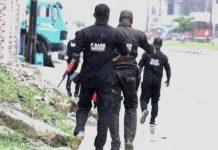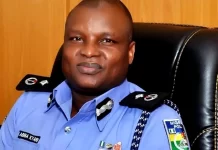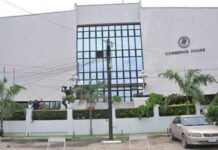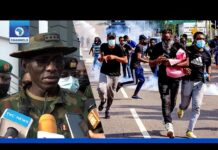
As the #EndSARS’ campaign continues to sweep across the nation, a 23-year-old man has recounted his horrifying encounter with operatives of the Special Anti-Robbery Squad (SARS), Awkuzu, in Anambra State.
It was learnt that some SARS operatives had been threatening the young man and because of this, his real name is concealed.
It is, however, important to note that Amnesty International is solidly behind this young man in his quest for justice. For the purpose of this write up, he would be called “Chijindu”.
Chijindu was arrested on February 13, 2017, in Anambra State, after he was accused of stealing a laptop.
He was moved to Awkuzu SARS around 6:30pm that fateful day. He recalled that immediately he was dragged to SARS office, he was frisked and his money, N15,400, which was in his pocket, was confiscated. The policemen also allegedly collected his wristwatch, necklace and phone.
He further recounted: “When the Admin officer saw me, he directed his men to go and hang me. They took me to the back of a hall and tied me with ropes. They tied my hands behind; tied my two legs and then joined the ropes in the hands and that of the legs by the back causing my chest to protrude.
They had two already prepared iron stands where they used to hang people. They crossed an iron rod through the ropes and then lifted me up by the rod and hung me on the iron stand. They started using all manner of items to beat me, including machete and sticks. They inflicted injuries on me.
“One of the officers, Simeon, used an exhaust pipe to hit my teeth, breaking them. I was left hanging for more than three hours. I shouted until I started vomiting blood. Another officer, Agaba, told them to bring me down; that he didn’t want to hear my cries again. When the officer left, my torturers forced a handkerchief into my mouth and tied it with a rope. I was in that state for more than two hours and then I became semi-conscious.”
According to Chijindu, when Simeon came to check and noticed he had almost lost consciousness, he called their team leader, Aghaogu, who was also the second in command (2ic) of the team. Aghaogu ordered that Chijindu be brought down.
Chijindu said: “They dumped me inside the interrogation hall. Simeon brought my phone, and asked me if I was the owner. I told him I bought it with my money. He took out my two SIM cards and destroyed them with his teeth. He then dropped the phone into his drawer. He told me that it was exhibit.
“Aghaogu instructed them to take me to cell five, which is the worst cell in Awkuzu SARS. Those in cell five hardly eat or drink water. The next morning, they brought me out of the cell and took me to Onitsha. They forced me to go and show them where I sold phones and laptops. In Onitsha, at Emeka Offor Plaza, they arrested four persons, alleging that the four guys bought things from me.
“But the truth was that I had never met any of those men in my life. They also took me to my aunt’s house in Onitsha and arrested her son. When we returned from Onitsha, they returned me to the place where they had hung me the previous day.
They threatened to hang me again since I didn’t want to confess. Another officer, Peter Emiator, took a 2×2 wood and started hitting me on my two legs. He said that he would cripple me since I seemed to be stubborn.
He gave me several injuries.The scars are still on my body.”
He said that at a point, Aghaogu took Simeon to one corner and had a discussion with him. After the discussion, Simeon returned and without blinking, pulled out his gun and fired Chijindu’s right leg. Another officer, who witnessed the cold blooded shooting, reprimanded Simeon.
“My leg started bleeding. Simeon told him that he shouldn’t worry, that they would treat me. Then they took the singlet of one of their victims and tied the bullet injury and returned me to cell five. The owner of the singlet was terribly tortured and shot in the leg and dumped in the cell without any treatment. He died the following morning as a result of the torture,” Chinjindu recalled.
The following day, the person that allegedly complained that Chijindu stole his laptop, paid a visit to SARS. The suspect was brought and right in his presence, the policemen started quizzing Chijindu about the laptop.
Chijindu said: “I told them that I didn’t know anything about the laptop. The complainant left and I was returned to the cell. That was the last time I heard from the complainant. He didn’t visit again. I was kept in the cell from February 13, 2017 to March 17. We were not given food except some Reverend Sisters or family members of detainees bring food. The Reverend Sister usually bring food on Thursdays and Saturdays.
On March 17, there was a rumour that the Human Rights people were coming on emergency inspection of Awkuzu SARS. The policemen brought us out; we were 10 in number. They put us in bus and moved us to another of their cell in Neni.”
The Commander at Neni told Chijindu and other suspects to remove their boxers, which was the only garment they had on. The suspects were left naked. The commander instructed his men to take the suspects to cell one. This cell is nicknamed, ‘condemned cell.’
Chijindu narrated: “We passed two passages and then went to a third passage, leading to the cell. After a while, the commander came to address us. He promised to speak with the OC at Awkuzu, to permit them at Neni to give us water to drink.
“We waited for two days without any food or water. Then some of us started shouting from the cell, calling on them to give us water. Some of us started urinating and drinking the urine. One of the officers at Neni, nicknamed ‘Too-much-money,’ admonished us to save our strength. He said that we still had a long way to go. Because of this admonition, we shouted the more. We screamed that it was better for them to shoot and kill us, than to starve us to death.
They replied that they preferred to watch us die one after the other.”
When the suspects continued to cry weakly for water, the exasperated policemen allegedly teargas them into silence. The suspects started crying; they prayed for death, but death refused to come. They were brought out from their cell, and teargassed again, but this time with another kind of teargas; this one was wrapped. The policemen then locked the suspects inside, with many almost choking to death.
Chijindu said: “It was terrible. All of my fellow inmates collapsed. Some were foaming from the mouth. I was the only conscious person, but the effect of the gas was bending my neck and twisting my two hands. We were in that condition for three days. On the third day, they came to check whether we were still alive.
“They found that we were still breathing, although the teargas had dried almost all the water in our system, making us weaker. They washed the cells and applied some substances after which they returned all suspects to cells.”
All this while, the suspects were yet to be given water. Chijindu said that they continued to beg for water, but there was no succor.
The Station Officer (SO) asked if any of the suspect came to the world with any cloth, they responded no. He then asked them if they would go with any cloth when they died, they also responded no. He then left them without saying another word.
Chijindu noted: “It was then we realized that it was a death sentence.”
He continued: “After that week, one of us, Ifeanyi, was bailed, leaving nine of us behind. Before the end of that second week, four, among us died; Okechukwu, Uchenna, Uchechukwu and Chinedu. Their corpses were left with us in the cell until the policemen were ready to evacuate them.”
Chijindu further revealed that on the third week, three persons died; Ngirima, Victor Azubuike and Ojoto. Two among the corpses were moved after a full day in the cell with the suspects, while Ojoto’s corpse was left in the cell with the suspects for three days before it was evacuated. Chijindu said that the corpse Ojoto was already decomposing before it was removed.
“When the policemen were taking Ojoto’s remains away, I heard them saying, “this one don rotten; no need to carry go Akwuzu, make we bury am for here”.
I managed with the little energy left in me to stretch and peep through our tiny window. I watched and saw how they buried Ojoto beside a soak-away-pit at the back of their office there in Neni,” said Chijindu.
On Easter Sunday, one of the officers came to attend to suspects in the cells. He told the suspects that their commander would celebrate Easter for them. Alas, nothing was given to them.
The following day, which was Easter Monday, while Chidinju was praying, he heard Tochukwu give up his last breath . The suspects alerted the policemen and Tochukwu’s corpse was moved.
But before Tochukwu died, two new suspects had joined them in the cell. They are Ifeanyi Mba and Ekene Nwoke. They were both transferred from Akwuzu. When Tochukwu died, Ifeanyi and Ekene started crying.
A week after the death of Tochukwu, there were moves to bail one of the new suspects, Chinjidu secretly handed him a piece of paper. The paper contained non-inked written information on how to locate his sister and the direction to his home in Nnewi which he had managed to scribble with a piece of broken broom stick.
The young man fulfilled his promise; he located the home and family of Chijindu. He disclosed to them, the horror the young men were passing through in SARS detention facilities. Chijindu family contacted some Human Right activists. It was discovered that Chijindu family members didn’t know he was in detention. They had been looking for him, almost about to declare him missing. Chijindu family and the activists started making frantic efforts to get him out.
They were further worried after hearing that he had a gunshot wound on his leg, which was festering.
Chijindu said: “The Human Rights people went to Awkuzu and asked after me, the OC SARS called the Station Officer in Neni, who was behind our cell taking his call. The OC reprimanded the commander for allowing us to survive. I overheard their conversation because the SO’s phone was on speaker. The OC accused them of giving us food, an accusation which the SO denied.
Then the SO and his men brought all of us out and started flogging us. They were mad at me. They searched everywhere, looking for writing materials or phone, with which I communicated to the outside world. They couldn’t find anything. They threatened to bring me out and “finish” me. On April 24, 2017, around 9:30pm, some policemen came to Neni and took me to Awkuzu.
“The following day, which was a Tuesday, policemen brought me out to the see the OC SARS. The OC asked me if I was Chijindu, I said yes. He openly expressed shock that I survived Neni.
The OC then asked me whether I had eaten anything, I said no. He asked me what I wanted to eat, I told him that I wanted liquid as I found it very difficult to swallow. He asked them to go and get me tea with bread.
The following day they took me to Magistrate’s Court at Nteje.”
When Chijindu was arraigned, it was discovered that there was no complainant, no witness. He also didn’t have legal representation. The police charged him for armed robbery. The Magistrate referred the case to High court.
The New Telegraph Newspaper, had earlier chronicled an award winning piece on the killings of suspects and other atrocities committed by SARS men across Nigeria. The chronicle was recognized and applauded by the Wole Soyinka Centre of Investigative Journalism.
The atrocities in SARS had spanned many Inspectors-Generals of Police, but it is on record, that former IGP, Solomon Arase rose against such horrendous activities. It was also during his administration that some SARS men were dismissed for killing detainees and other shocking acts.
Immediately Arase left office, the Force went back to its old ways of flagrant impunity.
An Amnesty International Nigeria spokesperson, Mr Damian Ugwu, reacting to those support SARS activities, said: “It was disheartening to see pictures of young man and women in Port Harcourt and Abuja, carrying banners in support of SARS. I often wonder how far some Nigerians are willing to go to survive. Most worrisome is that some people who claimed to represent Anambra State were also part of the charade. For the record Anambra State is the home of SARS Awkuzu.”
According to Amnesty International, detainees were subjected to “horrific torture methods, including hanging, starvation, beatings, shootings and mock executions, at the hands of corrupt SARS officers.
Ugwu, said: “A police unit created to protect the people has instead become a danger to society, torturing its victims with complete impunity while fomenting a toxic climate of fear and corruption. Our research has uncovered a pattern of ruthless human rights violations where victims are arrested and tortured until they either make a ‘confession’ or pay officers a bribe to be released. Most of the time, huge amounts ranging from N100,000 to even N500,000 was paid to secure the release of some of those detained. Failure to meet such huge financial demands meant imminent death while in detention. The SARS officers are getting rich through their brutality because as you can see, it seems that torture has become a lucrative business.”
Amnesty International said it found 130 detainees living in overcrowded cells at a SARS detention in Abuja known as the ‘Abattoir’.
Investigation has showed that people detained by SARS, are often not allowed access to a lawyer, a doctor or family members while in incarceration. Yet in various cases where victims of police torture or other ill-treatment attempted to seek justice, the authorities took no action.
“It is time for the authorities to ensure that officers responsible for such human rights violations are finally held accountable. There is also an urgent need for robust legislation that ensures all acts of torture are offences under Nigeria’s criminal law,” said Ugwu.
Kindly contact us @ Naijalivetv@gmail.com
Call or Whatsapp: 07035262029, 07016666694, 08129340000






![Lekki Toll Gate: Army ‘Killed Unarmed, Defenseless Protesters’ – Lagos Panel [FULL LIST]](https://www.naijalivetv.com/wp-content/uploads/2021/11/82BD2742-354C-4BE0-BBCD-61EF1F72747B-218x150.jpeg)



